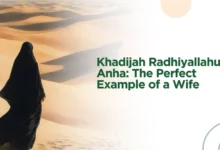The Meaning of Eid al-Fitr in Making Financial Hijrah
The Meaning of Eid Al-Fitr and Its Link to Financial Hijrah
Eid al-Fitr is a much-awaited moment for Muslims after the blessed holy month of Ramadan. More than just a celebration, Eid has a deep meaning that is not only limited to spiritual aspects, but also to social aspects, including in terms of finance. For many Muslims, Eid al-Fitr is the perfect time to make a financial hijrah, especially in leaving the practice of usury towards a financial system that complies with sharia principles.
Also Read: Islamic Economic System and the Prohibition of Interest (Riba)
1. Avoiding Riba and Switching to a Financial System in accordance with Islamic Law
Ramadan, as a month of worship and introspection, provides an opportunity for Muslims to reflect on various aspects of life, including how they manage their finances. One of the important things that often comes into focus is avoiding usury and finding ways to switch to a financial system that is more in line with Islamic teachings.
Also Read:
Creating a Waqf: Essential Conditions You Need to Know
Understanding the Different Types and Restrictions of Waqf Property
Qur’anic and Hadith Evidence on the Haram of Usury
The Quran explicitly forbids usury in several suras, including Surah Al-Baqarah verses 275-279. Among these verses, Allah SWT says:
لَّذِينَ يَأْكُلُونَ الرِّبَا لَا يَقُومُونَ إِلَّا كَمَا يَقُومُ الَّذِي يَتَخَّطُهُ الشَّيْطَانُ مِنَ الْمَسِّ ۚ ذَٰلِكَ بِأَنَّهُمْ قَالُوا إِنَّمَا الْبَيْعُ مِثْلُ الرِّبَا ۗ وَأَحَلَّ اللَّهُ الْبَيْعَ وَحَرَّمَ الرِّبَا ۚ فَمَنْ جَاءَهُ مَوْعِظَةٌ مِنْ رَبِّهِ فَانْتَهَىٰ فَلَهُ مَا سَلَفَ وَأَمْرُهُ إِلَى اللَّهِ ۖ وَمَنْ عَادَ فَأُولَٰئِكَ أَصْحَابُ النَّارِ ۖ هُمْ فِيهَا خَالِدُونَ
“Those who eat (take) usury cannot stand but as one possessed by a demon because of insanity. This is because they say that buying and selling is the same as usury, whereas Allah has made buying and selling lawful and usury unlawful.” (Al-Baqarah: 275)
The hadiths of the Prophet Muhammad also emphasise the prohibition of usury. In a hadith narrated by Abu Hurairah, the Prophet said:
اجتنبوا السبع المُوبِقَات، قالوا: يا رسول الله، وما هُنَّ؟ قال: الشركُ بالله، والسحرُ، وقَتْلُ النفسِ التي حَرَّمَ الله إلا بالحق، وأكلُ الرِّبا، وأكلُ مالِ اليتيم، والتَّوَلّي يومَ الزَّحْفِ، وقذفُ المحصناتِ الغَافِلات المؤمنات.
“Avoid the seven major sins.” The Companions asked, “O Messenger of Allah, what are the major sins?” He replied, “Ascribing partners to Allah, sorcery, killing a soul that Allah has forbidden except for a just cause, consuming usury, eating the property of orphans, running away from the battlefield (during jihad), and accusing believing women who are good and obedient of committing abominable and bad deeds.” (HR. Bukhari and Muslim)
From the above verses and hadiths, it is clear that usury is a practice that Muslims should avoid. Instead, Islam encourages its followers to conduct fair transactions, based on the principles of justice and shared prosperity.
Also Read:
Implementation of The Zakat System in The Modern Era
Bunga Bank Samakah dengan Riba?
2. Switching from a Conventional Bank Account to an Islamic Bank Account
So, Eid al-Fitr is the perfect moment for Muslims to make a financial migration from the usury system to a financial system that is more in line with Islamic law. The first step is to move your conventional bank account to an Islamic bank. By moving our conventional bank accounts to Islamic banks, Muslims have contributed to presenting a sharia-compliant financial ecosystem for their benefit where deposits and loans provided from these deposits are presented with sharia-compliant schemes.
Also Read:
4 Cara Melunasi Hutang Riba
3. Start Investing Shariah-compliant Portopolio
One of the other concrete steps that can be taken is to start investing in shariah-compliant investments, which follow the principles set out in Islam.
Shariah-compliant investments offer a variety of financial instruments that comply with shariah principles, such as mudharabah (profit sharing), musyarakah (co-operation), and murabahah (sale and purchase with markup). Through these investments, Muslims can earn profits without having to violate religious principles.
Also Read: The Eight Categories of Asnaf: Who Qualifies for Zakat Distribution?
4. Ridding Ourself of Riba-based Debt, by Not Owing and Immediately Paying Off What Remains
In addition, Eid al-Fitr is also the perfect moment to rid oneself of usury debts by vowing not to add any more usury debts and paying off the remaining ones. Islam emphasises the importance of paying debts as soon as possible, especially debts that involve usury. By ridding themselves of usury debts, Muslims can start a new chapter in their financial lives that is cleaner and more in line with Islamic teachings.
In this context, many Islamic financial institutions offer various products and services to assist Muslims in making a financial hijrah. By utilising these institutions, Muslims can get help and encouragement in starting their journey towards more Islamic finance.
Also Read:
The Virtue of Charity in the Month of Ramadan
5. Conclusion
In conclusion, Eid al-Fitr is not only a time to celebrate victory over oneself after a blessed Ramadan, but it is also the perfect time to make a financial hijrah. By avoiding usury and following Islamic financial principles, Muslims can build healthier and more blessed finances. Let’s utilise the momentum of Eid al-Fitr to build a healthier and more blessed finances. Let’s utilise this Eid momentum to start a change towards a better financial life in accordance with Islamic teachings.
Also Read:
Kaya Tanpa Riba
4 Tahapan Riba di dalam Al-Quran, Apa Solusinya?
References
- Al-Quran.
- Sahih al-Bukhari. Hadits No. 2387.
- Sahih Muslim. Hadits No. 1598 a.
- El-Gamal, M. A. (2006). Islamic Finance: Law, Economics, and Practice. Cambridge University Press.







